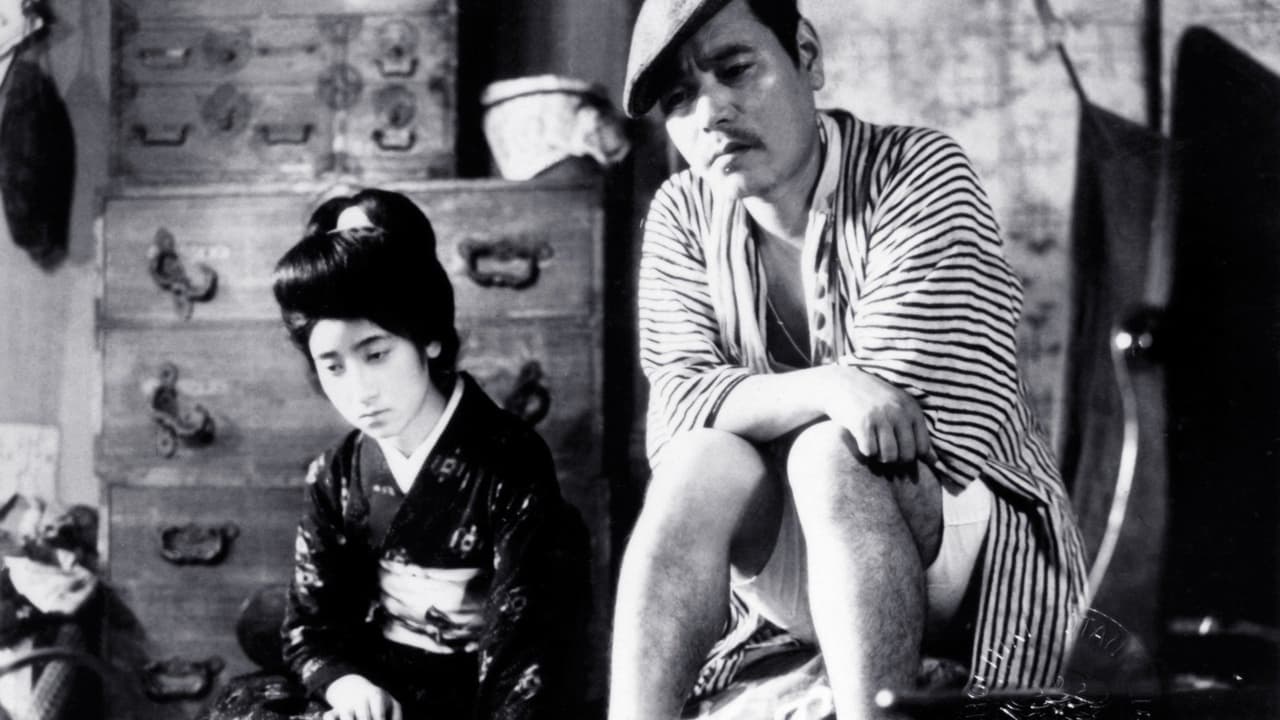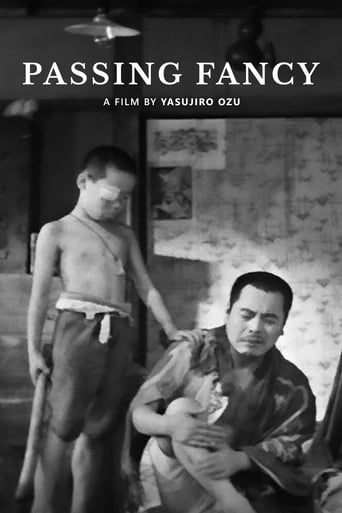

Bad Acting and worse Bad Screenplay
... View MoreThis is a tender, generous movie that likes its characters and presents them as real people, full of flaws and strengths.
... View MoreGreat story, amazing characters, superb action, enthralling cinematography. Yes, this is something I am glad I spent money on.
... View MoreGreat example of an old-fashioned, pure-at-heart escapist event movie that doesn't pretend to be anything that it's not and has boat loads of fun being its own ludicrous self.
... View MoreIn Passing Fancy we can see Yasujiro Ozu edging, however reluctantly, toward sound. For a silent movie it has an extraordinary number of intertitles, reflecting a stronger reliance on dialogue to carry the story and the relationships of the characters. Ozu even departs from convention on occasion to show a title card before the character has spoken the line. The film also shows more of the development of Ozu's personal style as a director than some of his contemporary silent films do: There's a greater reliance on low-angle camera-work, his so- called "tatami shots," and a more frequent use of shots of streets and buildings that don't necessarily carry information about the plot and characters but serve as something like "chapter breaks" in the narrative. But film technique aside, Passing Fancy would be remembered as one of Ozu's most charming early films. Takeshi Sakamoto plays Kihachi -- a character name the actor would retain in other films by Ozu, including A Story of Floating Weeds (1934) and An Inn in Tokyo (1935). The several characters are discrete from one another, although the Kihachi in Passing Fancy bears some resemblance to the one in An Inn in Tokyo in that they are both single parents of a son played by the marvelous child actor Tomio Aoki. (If you're not confused yet, let me also add that in Passing Fancy Aoki is billed as "Tokkan Kozo," the title of a 1929 Ozu short film based on O. Henry's "The Ransom of Red Chief" in which Aoki appeared. Oh, and that in Passing Fancy, the character is named Tomio.) Anyway, Kihachi and Tomio share rundown lodgings with Jiro (Den Obinata), who works with Kihachi in a brewery. Tomio is a good student, and he's a bit embarrassed by his illiterate and occasionally drunken father. One night, Kihachi and Jiro encounter a young woman, Harue (Nobuko Fushimi), who has just been fired from her job and is looking for a place to stay. Jiro is suspicious that Harue is "no better than she ought to be," as the saying goes, but Kihachi is smitten with her and arranges for her to live with and work for Otome (Choko Iida), a woman who owns a neighborhood bar-restaurant. Kihachi begins to spruce himself up to woo Harue, but she's more attracted to the younger and handsomer Jiro. Eventually, Otome persuades Kihachi that he's too old for Harue and that he should try to get Jiro to return her affections. Then Tomio falls ill and, following the familiar sick-child motif of many Japanese films in the 1930s, Kihachi is pressed to find a way to pay the doctor bills. Ozu's generous humor and genuine affection for his characters suffuses the film, and the splendid rapport of Sakamoto and Aoki as actors provides a special insight into the often volatile father-son relationship. There's a wonderful scene, for example, in which Kihachi slaps Tomio once too often and the boy turns around and begins to pummel his father, who submits, resulting in a deeper understanding between them. The screenplay is by Tadao Ikeda, from a story by Ozu under his pseudonym James Maki. The cinematographers are Hideo Shigehara and Shojiro Sugimoto. (charlesmatthews.blogspot.com)
... View MoreViewed on DVD. Restoration = four (4) stars. We've all been there: struggling to find the pause button in the dark on your player's remote so you will not miss anything when you are momentarily away from your viewing area. Well folks, it's not a problem with this movie. Just keep it running; when you return you will find you have missed nothing of significance! This is because nothing of significance appears to occur in this film which seems fixated on trivia, fleas (or lice), and fans. Although the actors sure try to build re pore and empathy with viewers, the director seems satisfied with the notion that trivia, fleas, and fans will carry the day. Not really! Staying with acting for the moment, it is (for the most part) first rate and you have likely seen (or will see) many of these actors before (or again)--as members of the director's acting company or, more likely, from the ranks of the studio's contract players). But the actors face a losing battle struggling with a dull script, having to scratch and fan themselves with numbing (pun intended) regularity, and less-than-inspired direction. (The plot is among the missing and the ending is flat out ridiculous!) The artificiality of a studio bound production (except for one outdoor scene) is embarrassingly obvious with small sets for both interiors and "exteriors." Cinematography suffers from the absence of deep focus. Costumes rarely change; some characters wear the same costume; it looks like the actors may have had to provide their own wardrobe. Intertitles and subtitles often occur faster than the speed of speed reading. The piano score is fine, but it's lively nature can not reanimate dead trivia. Restoration is not there yet: distracting deterioration artifacts often occur at what seems to be where reel changes took place. Criterion graphic artists are still having fun frustrating the viewer by making a game of how to turn subtitles (and the piano score) on/off. Bottom line: A padded-out featurette that goes nowhere--very slowly. WILLIAM FLANIGAN, PhD.
... View MoreLike many Ozu films, 'Passing Fancy' is about the difficulties of father-son relationships, set in a small Japanese town, mostly passing with the intimate indoor conversations of characters, which framed in a certain way manages to reveal great depth. In this particular instance, in a one room house with few furnishings and damaged walls, the father and son are very poor, but the arrival of an unknown young female to the town sparks a love interest. It's a pity a film with so much great dialogue is silent, but the technology may not have been available to them at the time in Japan, and once you get used to the rhythm (which only takes a scene or two) it is not something that bothers you. Kihachi is a loveable fool, who smiles and charms easily, but drinks excessively, skips work often, and slowly reveals a raw unattractive side with insensitivity towards his son. You will cheer him on one minute, and despise him the next. It's a film about the difficulties of money, but even more so about responsibility - of being a father, educating our children well, and in the way we conduct relationships.Ozu films are always associated with home and family and friends but the strong feelings he generates seem rarely to dip into sentimentality. Often it is the small details that stand out - holding that frame of the suburban background just an extra second or two after after the character exits - a small touch, but one that allows time for reflection. Or in the scene where the child slaps the father, how he scrunches up his pants before doing so, the tiniest gesture to reveal he has doubts or concerns about doing it. Ozu trusts the tiny details - blink and you'll miss them - to reveal the big, which makes his films feel both humble and meaningful at the same time. They are wise, not showy.The third act and particularly the very end is the only part of this film melodramatic enough to feel written for a movie, but it redeems itself by rounding off a great joke and finishing as it began - with a dose of humour amid an otherwise dramatic tale.
... View MoreDekigokoro (Passing Fancy), is one of Ozu's 3 masterpieces from 1933. It stars the second of cinematic Ozu's "alter egos", Takeshi Sakamoto. Sakamoto typically plays a down and out working class father. Here, he is especially dense, to excellent comic effect. Tomio Aoki (in probably his most significant child role) plays a kid who seems to be considerably brighter than his father -- and who does more to keep the household running. Aoki is (of course) quite funny. But he also does an excellent job of showing a child's response to unwanted change. He and his father have long depended solely on each other -- but now his father has his eye on a young woman who has moved into their slum neighborhood. Aoki very much resents his father's interest in the woman -- and resists her attempts to win his affections.This is an extremely visual film, with lots of completely "wordless" humor. The film starts out with an extended scene in a music hall (Chishu Ryu performing as the "singer") in which first a lost wallet circulates, and then a flea (or fleas). Probably not as great a family drama as the prior "I Was Born But" or the subsequent "Tokyo Inn", but nonetheless quite enjoyable.
... View More